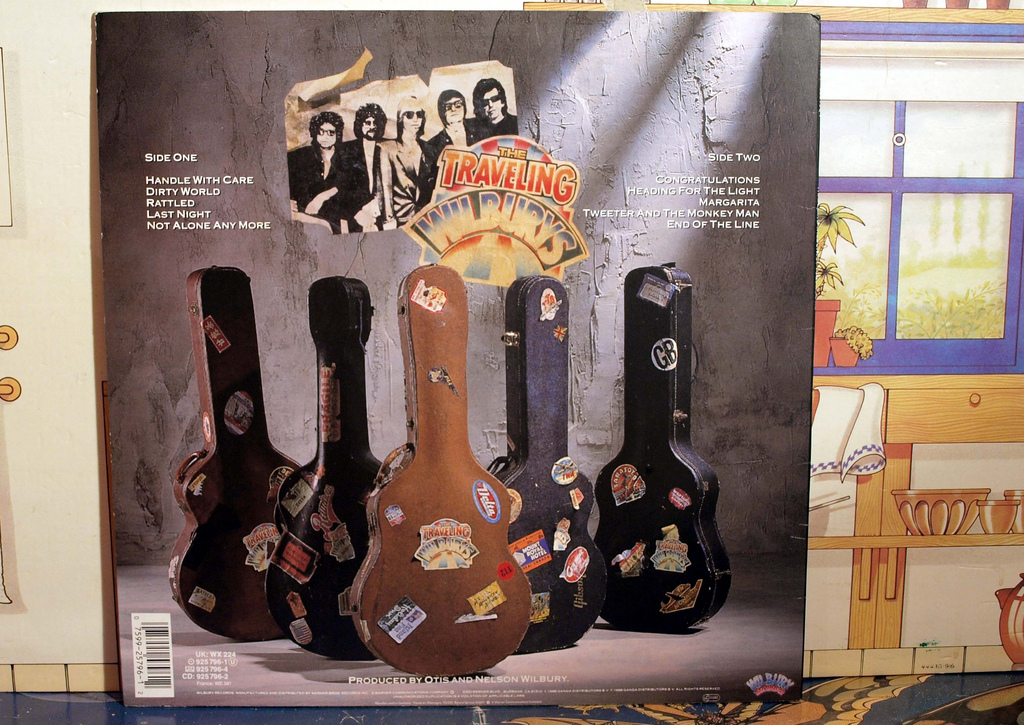With Monday’s passing of Tom Petty at 66 years old, we are all going to look back and reflect on his career. So I want to take a look at one of his lesser known and under-appreciated projects, the supergroup called The Traveling Wilburys.
It consists of Petty, George Harrison, Bob Dylan, Roy Orbison and Jeff Lynne. Five musical powerhouses in their own right that recorded a song together by accident and circumstance, and turned into a full fledged band.
This is how the story goes: Harrison was in Los Angeles in 1988 and needed to record a song for the B-side of “This Is Love,” one of his singles. Lynne was in the city producing albums for both Petty and Orbison. Harrison told Lynne and Orbison his need to write a new song in a day, and the two offered him help to do so. They then needed a studio to record in at short notice, and asked to use Dylan’s home studio. He gladly let them use it, but also asked to help on the song. On his way to the studio, Harrison stopped by Petty’s house to pick up one of his guitars and invited him along as well. The five then wrote and recorded “Handle With Care.”
The song was so good that they decided to keep it, form a band and record nine more songs together to release an album.
“Traveling Wilburys Vol. 1” was released the same year and was a critical and commercial success, selling two million copies within six months in the US. It reached Number 3 in the US charts and spent over 50 weeks there. The album was certified triple-platinum by the RIAA.
“Vol. 1” was the highest charting album for Dylan, Orbison, and Lynne in several years.
The album was driven by the band members desire to jam out together, and in the interest of making it an ego free project, they all adopted fake names with the last name Wilbury and shared the songwriting credits. Their real names did not appear on the album.
Harrison became Nelson, Lynne was Otis, Orbison was Lefty, Dylan was known as Lucky and Petty was Charlie T. Wilbury Jr.
The name was created by using the term Harrison and Lynne used to refer to studio equipment. They called Limiters and equalizers “wilburys.” Hence, The Traveling Wilburys.
The atmosphere of the recording sessions were laid back, and it contributes to the relaxed feeling of the music.
“We would arrive about twelve or one o’clock and have some coffee,” Lynne said of the sessions. “Somebody would say, ‘What about this?’ and start on a riff. Then we’d all join in, and it’d turn into something. We’d finish around midnight and just sit for a bit while Roy would tell us fabulous stories about Sun Records or hanging out with Elvis. Then we’d come back the next day to work on another one. That’s why the songs are so good and fresh—because they haven’t been second-guessed and dissected and replaced. It’s so tempting to add stuff to a song when you’ve got unlimited time.”
I personally love this album because it feels like the best of the five artists was thrown into a blender and made a truly special product. You can feel that they are having fun working together.
Songs you should listen to from their first album are “Handle With Care,” “End of the Line,” “Congratulations” and “Rattled.”
Months after the release of “Vol. 1,” Orbison died surprisingly after a heart attack. The band forged on in his memory and released a sequel in 1990 jokingly titled “Traveling Wilburys Vol. 3.” While not as good as the first, it contains some gems, like “Wilbury Twist” and “The Devil’s Been Busy.”
In 2001, Harrison passed away due to lung cancer, and the Wilburys did as well since Harrison held the rights to both albums and was the unofficial leader of the group.
Now only Dylan and Lynne remain following Petty’s death. However, the music lives on and now is as good a time as any to brush the dust off and listen to the five superstars jam out.
I’ll leave you with the chorus of “End of the Line.”
“Well it’s all right, riding around in the breeze
Well it’s all right, if you live the life you please
Well it’s all right, doing the best you can
Well it’s all right, as long as you lend a hand”
Henry Wolski
Executive Editor


